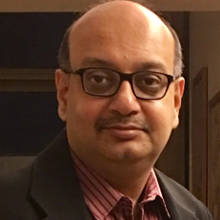[N Chandrasekaran, the newly appointed chairman of Tata Sons. Photograph by World Economic Forum/Eric Miller under Creative Commons]
On January 12, the proverbial white smoke emanated from the chimneys of Bombay House, the seat of power at the Tata group, almost six weeks ahead of schedule. The hurry was understandable. The undignified mess sparked off by Cyrus Mistry’s abrupt sacking had impacted morale and taken the sheen off the Tata group. A new chairman, a quintessential insider, is expected to heal the wounds and bring the focus back on business.
So what can one expect from one of the most keenly watched leadership transitions in recent times?
First, much would depend on how the chairman of the Tata Trusts, Ratan Tata, and his Tata Sons board decide to set the rules of the game. Chastened by the fallout of the Mistry tenure, they could choose to redraw the lines of command—and set the boundaries a lot more explicitly. If that’s indeed the case, a number of key decisions would have already been taken at the Tata Sons board level, even before N Chandrasekaran, or Chandra as most people call him, formally takes over. To know which way the wind is blowing, keep your eyes peeled on any major announcements over the next few weeks. Consider just two: Allowing Tata Steel Europe more time to heal itself. And settling the DoCoMo issue amicably. In effect, the focus will be on taking a longer view of things. And no aggressive chop-and-change to meet financial outcomes. Whether that is passed off as a Tata way of working or a case of covering up bad decisions, only time will tell. Either way, Chandrasekaran will clearly know what’s non-negotiable. Now, how such decisions could impact the complex governance model—and the independence of the boards at each of the listed companies—is anybody’s guess.
At the same time, Mistry was running what one might describe as an activist corporate centre. He was engaged closely in the management of some of the key group companies and leaving them responsible largely for execution. In comparison, JRD Tata’s approach was hand-off. Between these two extremes, there are two other ways to develop a parenting approach, as laid out by a paper titled Designing the Corporate Center: How to Turn Strategy into Structure from the Boston Consulting Group. Chandrasekaran will need to quickly decide how he chooses to organise his own corporate centre.
Second, as the big boss at TCS, Chandrasekaran has already served the technology needs of many of the Tata companies. He would have a pretty good fix on quite a few of their key business imperatives. And he is unlikely to be in a tearing hurry to make any dramatic changes till he gets a grip on key strategic issues. After all, he has capable leaders at most of the group companies like Tata Steel, Tata Motors or The Indian Hotels Company (IHCL). And with his sterling track record at TCS, it would be safe to assume that he would have their respect.
However, Rajesh Gopinathan, his own replacement at TCS, hasn’t been tested as yet. Chandrasekaran, by all indications, would be well aware of that. During his seven-year run as MD and CEO, Chandrasekaran developed a core leadership team that stuck by him. Except for Abidali Neemuchwala, who left to join Wipro and was later appointed as its CEO last year, there have been very few top-level exits. It is a testimony to the personal loyalty that Chandrasekaran commands inside TCS. How the leadership responds to its new CEO will need to be gauged. As group CFO, Gopinathan has not had the exposure to the rank and file and there are lingering doubts about his grasp of key technology shifts as well. How he inspires confidence of people both inside his own organisation and also with the wide array of global clients will be interesting to watch. Given the critical role that TCS plays in the Tata group portfolio, Chandrasekaran will most certainly have to continue grooming Gopinathan for the next one year.
Third, even as Chandrasekaran settles into his new role on February 21, work on a new strategic blueprint for the group will need to begin. It took Mistry’s team, led by Nirmalya Kumar, a little more than a year to draft the strategic plan—based on three rounds of feedback from the Tata Sons board. Given the acrimony of the past few months, it remains to be seen whether that plan is now entirely buried—or at least partly reviewed. It is also entirely possible that the Tata Sons board asks Chandrasekaran to draft in one of the blue-blooded management consultants like McKinsey & Co or Boston Consulting Group to lead the process.
Much has been made about Chandrasekaran being the first non-Parsi to make it to the helm of one of India’s best known conglomerates. His appointment took place under exceptional circumstances, when the entire edifice of trust on which the institution rests was called into question. Let’s hope his presence helps provide the much-needed healing touch.
(First published in Business Standard)



